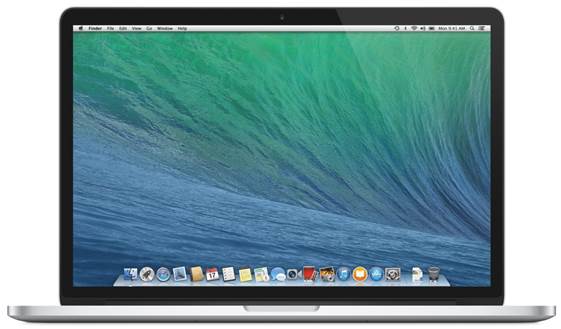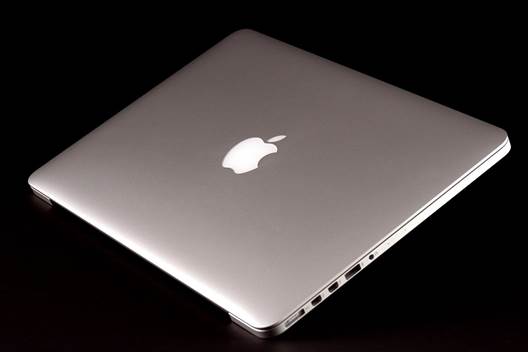When portability is more important than ultimate
performance, the 13in MacBook Pro with Retina display is the tool for the job.
Weighing less than 1.6kg, it's in true ultraportable territory, with state-of-the-art
build quality, performance and battery life.
Prices start at $1,649 for the 13in model, which is a
significant reduction over the $2,174 original. The entry-level model combines
a 2.4GHz Intel Core i5 dual-core processor with 4GB of memory and a 128GB SSD.
The middle version ups the RAM to 8GB and the storage to 256GB, and costs
$1,874. The top-end MacBook Pro, reviewed here, comes with 8GB of RAM and a
512GB SSD, plus a higher-clocked 2.6GHz Core i5. It costs $2,249. You can
specify a 2.8GHz Intel Core i7 chip for an extra $270,16GB of memory for $240,
and a 1TB SSD for $600.
The unibody chassis is a fraction thinner than its
predecessor at 18- rather than 19mm. It's rigid, tough-feeling and impeccably
finished in satin sand-blasted aluminum. Light bleed from the backlit keyboard
has been reduced. Despite some short-travel keys, we found typing comfortable
and nearly effortless.

Apple MacBook Pro
with Retina display 13in
The Retina display is an IPS panel with bonded front glass,
treated with a reflection-reducing optical coating. Its native resolution is
2560x1600 pixels, although an HiDPI mode in OS X renders the UI at 1280x800
pixels.
At 1.56kg, the MacBook Pro is around 220g lighter than its
predecessor. This may be in part due to the reduced battery capacity, from 74-
to 71.8Wh.
Last year's MacBook Pro with Retina display ran cool and
quiet, and this year's model perhaps even more so. We heard its cooling fan
only during graphics testing.
In Geekbench 3, this 13in laptop scored 3113 points in the
single-core test. That's not far off the 3254-point result of last year's
'Best' 15in MacBook Pro with Retina display. And in the full multi-core test it
scored 6719 points.
Improved graphics performance is one of the key changes
expected from the new Haswell processors. Playing games is possible with its
Intel Iris graphics. In Batman: Arkham City we measured an average 31fps at
1280x800, High detail. But in the tougher Unigine Heaven test, the Intel
graphics struggled to hit a smooth frame-rate. We saw an average 21fps at
1280x800, Medium detail.

The MacBook Pro is
around 220g lighter than its predecessor
Finding an IPS panel in a laptop is cause for celebration as
it offers wide viewing angles and richer, more accurate colors than TN screens.
But when a display has twice the resolution in both axes as the familiar
1280x800 size of Apple's 13in portables, we hit a pixel density of 227ppi,
which makes individual pixels invisible to the eye at reading distances.
Subjectively we found this IPS panel far superior to most TN
designs, but it wasn't markedly better under lab measurement. It could cover 98
percent of the sRGB gamut, and 69- and 75 percent of NTSC and AdobeRGB. The
best IPS screens hit 100 percent AdobeRGB.
The contrast ratio was around 550:1 at its comfortable
mid-range brightness settings, rising to 610:1 at its brightest (292cd/m2).
Color accuracy was creditable, with an average deviation of 1.44 Delta E.
Apple quotes up to nine hours of wireless web or iTunes film
playback. Given that it has changed its test methodology, setting screen
brightness to 75- rather than 60 percent, this nine hours is far from the 12
hours we'd hoped for following the MacBook Air refresh in June. In our own
tests, streaming an MPEG-4 HD film from a NAS (802.11ac, 120cd/m2),
the MacBook Pro lasted nine hours, 55 minutes.

Apple quotes up to
nine hours of wireless web or iTunes film playback
The MacBook Pro with Retina display now has a PCI
Express-connected SSD, bypassing the usual SATA interface for potential power
savings and faster data throughput.
Connected to a traditional SATA 3 bus, the best SSDs can
return sequential read speeds up to around 550MB/s. We tested with QuickBench
and saw reads of up to 795MB/s, and writes not far behind at 745MB/s. And importantly,
small random file transfers were extremely quick: 19- and 67MB/s respectively
for4kB random reads and writes.
New to the 2013 MacBook Pro with Retina display is support
for 802.11ac wireless. Copying a 21GB Blu-ray rip from a NAS drive, we recorded
a staggering 720Mb/s using the latest Apple Time Capsule over 5GHz wireless.
Verdict
This 13in MacBook Pro is marginally lighter, faster in every
important direction and still boasts a gorgeous Retina IPS display. Fast
storage, the latest Wi-Fi and fantastic battery life make it a must-have.

This 13in MacBook
Pro is marginally lighter, faster
|
Specs and price
·
Price: $2,249
·
Type: Laptop
·
2.6GHz dual-core Intel Core i5 processor (Turbo Boost up to
3.1GHz) with 3MB shared L3 cache
·
13.3in (2560x1600) display
·
Mac OS X 10.9
·
8GB of 1600MHz DDR3L onboard memory
·
512GB flash storage
·
Intel Iris Graphics
·
802.11ac Wi-Fi wireless networking, 802.11a/b/g/n compatible
·
Bluetooth 4.0
·
2x Thunderbolt 2
·
2x USB 3.0
·
1x HDMI
·
SD Card slot
·
stereo speakers
·
720p FaceTime HD camera
·
71.8Wh lithium-polymer battery
·
314x219x18mm
·
1.57kg
Rating
·
Build: 5/5
·
Features: 4.5/5
·
Performance: 4/5
·
Value: 4/5
·
Overall: 4.5/5
|